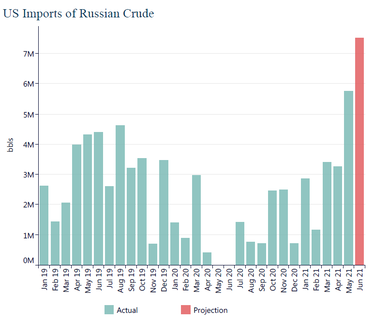 Image Source: Data Clipper Image Source: Data Clipper Days before President Joe Biden meets one-on-one with Russian President Vladimir Putin, imports of Russian crude oil to the United States reached a record high and are expected to increase this summer. The president, however, is not expected to address the increased cross-Atlantic oil trading when the two leaders meet on Wednesday. “Last month we saw a record 5.75 million barrels of Russian #crude discharged in the US, and we’re projecting a further record this month of 7.5mn bbls,” according to commodity trading analysts at ClipperData who monitor cargo shipments worldwide. Biden is set to meet Putin for one-on-one discussions following a large gathering of world leaders over the weekend during the Group of Seven (G7) Summit in Cornwall, England, which didn’t include the Russian president.
Climate change is widely reported among issues on the list of meeting priorities for the two leaders, though none mention curbing Russia’s growing oil exports to the United States. The summit will also cover strategic nuclear stability. The White House told media, “Biden will bring up ransomware attacks, Moscow’s aggression against Ukraine, the jailing of dissidents and other issues that have irritated the relationship ahead of the meeting,” according to Reuters. But failing to discuss record oil shipments with Putin would contradict Biden’s promise to exercise a “whole-of-government approach” to tackling climate change. At home, domestic oil producers have been targeted systematically by Biden’s climate agenda. In just five months, he has banned new oil and natural gas leasing on federal lands and waters and inside the Artic National Wildlife Refuge, closed down the Keystone XL pipeline project, and shuttered an oil refinery in the U.S. Virgin Islands. The White House’s apparent decision not to confront Putin is another indication that Biden is hard on American oil producers and soft on Russian producers. Last month, the Biden Administration gave the green light to the Nord Stream 2 natural gas pipeline from Siberia to Germany by lifting sanctions on the company. According to Reuters, U.S. State Department officials said Matthia Warning, CEO of Nord Stream 2 AG and an ally of Russian President Vladimir Putin, “engaged in sanctionable activity.” However, Secretary of State Antony Blinken “immediately waived those sanctions, saying that it was in the U.S. national interest.” The State Department’s decision undercuts lawmakers who have spent the past two years lobbying European nations to abandon the pipeline project connecting them to Russia because “it will give the Kremlin further leverage over U.S. allies.” Bob McNally, a former senior White House policy adviser told Bloomberg the Biden Administration “could weigh a ban on Russian oil imports as part of a larger review of Russia sanctions later this summer, though few in the industry see that as a real possibility.” American oil producers and lawmakers aren’t the only ones who should be upset by any failure from Biden to confront Russia. Our neighbors to the north should also be concerned. As Bloomberg noted, “Crude from Canada’s oil sands is an option” for displacing Russian imports. That was, of course, until last week when TC Energy, the Canadian company behind the project, formally ended its bid to build the pipeline nearly five months after Biden revoked the company’s previously approved permit. Comments are closed.
|
Archives
June 2024
Categories |


 RSS Feed
RSS Feed